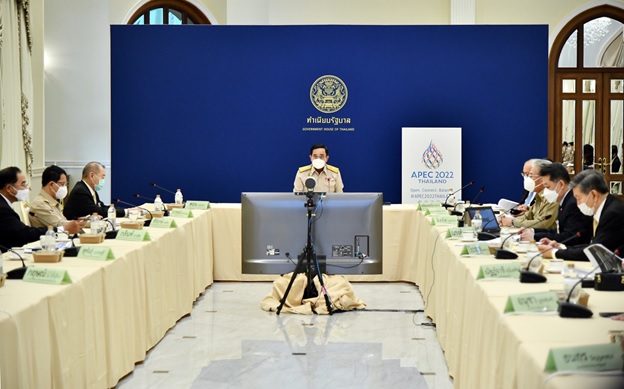The Bio-Circular-Green Economy (BCG) Executive Committee convened its first meeting of this year at the Government House on 7 February 2022. The committee – which has the Prime Minister serving as the chairman and NSTDA President as the secretary – has a mandate to set the policy and direction to drive the BCG national agenda.

Prime Minister General Prayut Chan-o-cha expressed his confidence that the BCG model will be able to add THB 200 billion to the GDP in 2 years. The investment in BCG sectors soared to THB 128 billion in the first nine months of 2021, with prime examples being NatureWorks Asia Pacific’s THB 15 billion investment plan to manufacture biopolymers from the world’s most advanced bioplastic technology, Mitr Phol Sugar Corporation’s additional THB 3 billion investment, business investment in alternative proteins, and biotech ventures such as Genepeutic Bio providing cell and gene therapy for leukemia and Baiya Phytopharm manufacturing biopharmaceutical products from plant-based technology. New measures and regulations have been introduced such as a new regulation to promote denatured alcohol businesses and more privileges offered to BCG regional investment.
In addition to boosting the economy, the BCG agenda also sets goals in reducing social inequality, improving access to healthcare, increasing energy self-sufficiency, cutting down greenhouse gas emissions, adding more forest area and upskilling workers through a host of projects.
The shift from crop production to seed production in 30,000 families has increased the average household income to THB 120,000, contributing THB 7.4 billion to the economy and better crop productivity and quality. The BCG community development project in Thung Kula Ronghai will uplift the livelihoods of 20,000 farmers and 2,329 poor people in 5 provinces - Sisaket, Surin, Maha Sarakham, Roi Et and Yasothon – by upskilling farmers and workers, promoting local innovations, improving access to market and upgrading farmers to entrepreneurs. This project is expected to reduce the population living below the poverty line by 50% within 3 years.
To increase access to healthcare, the National Health Security Office (NHSO) has expanded the Universal Coverage Scheme (UCS) to include the breast cancer genetic testing (BRCA1/BRCA2 testing) and a dental implant procedure. Initiatives such as precision medicine resulted from Genomics Thailand project and telemedicine will greatly contribute to the access to quality healthcare of Thai people.
To strengthen energy sufficiency, projects have been launched to encourage communities to utilize biomass energy and solar power. Sisaengtham Temple and Sisaengtham Village exemplify the model that generates electricity for consumption and sells the excess.
Greenhouse gas emissions can be reduced by improving energy efficiency in the manufacturing processes, adopting alternative energy in the transportation and logistic sector, minimizing food waste, implementing circular concept and design, as well as expanding forests. The goal to add 1 million rai (0.16 million ha) forest area will be met by engaging enterprises and private organizations to plant forests on the government land. The Electricity Generating Authority of Thailand (EGAT) has planted 200,000-rai forest, whereas the Mae Fah Luang Foundation, the International Society for Mangrove Ecosystems (ISME), and the World Climate Foundation have contributed 100,000 rai.
Reskilling/upskilling and capacity building projects have been implemented for farmers, factory workers and SMEs, as well as startups and innovation-driven enterprises (IDEs).
In this meeting, the committee has approved the following actions:
- Budget allocation. The Office of the National Economic and Social Development Council and the Budget Bureau were assigned to develop budget allocation guidelines and procedures for an effective implementation of BCG projects listed in the BCG Action Plan.
- BCG area-based development. The Ministry of Interior was assigned to employ a quadruple helix model to work with local agencies and organizations to develop and implement BCG area-based development projects based on the needs of communities and wealth creation to the locals.
- Ecosystem to promote industry investment. Six measures were approved:
- Deregulate denatured alcohol to increase value creation of ethanol. The Excise Department is in charge of this matter.
Increase investment in strengthening quality infrastructure to improve competitiveness and facilitate global trade of Thai businesses. The public-private partnership will be used as the main strategy to establish necessary infrastructure. - Accelerate the enactment of Biodiversity Law to promote bioindustry and allow the regulation of LMOs (Living Modified Organisms).
- Provide investment incentives to BCG regional projects with more than THB 150 billion investment in order to create more jobs in the community.
- Promote the manufacturing and use of autogenous vaccines in livestock and aquaculture with the investment in a GMP facility for the production of autogenous vaccines and the sandbox establishment.
- Establish BCG labelling scheme to gain public attention and promote BCG industries and products.
- Promote TAGTHAi as the Thailand Digital Tourism Platform to link tourists to services offered by both the public and private sectors and support high quality tourism.
- Deregulate denatured alcohol to increase value creation of ethanol. The Excise Department is in charge of this matter.
- Projects to support the people sector. Initiatives are underway, including the National Food Bank, platforms for logistics and surplus food management and a law similar to Korea’s Food Donation Act.
The meeting was concluded with Prime Minister Prayut asking all sectors to work cooperatively to drive BCG agenda to the success and to support APEC 2022 that Thailand is hosting this year.
